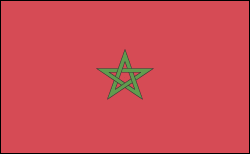- / Countries of the World
- / news and current events
Morocco News & Current Events

Index
- Morocco Profile
- History
- News and Current Events
Independence and Sovereignty of Morocco
In 1912, the sultan of Morocco, Moulay Abd al-Hafid, permitted French protectorate status. Nationalism grew during World War II. Sultan Muhammed V was deposed by the French in 1953 and replaced by his uncle, but nationalist agitation forced his return in 1955. In 1956, France and Spain recognized the independence and sovereignty of Morocco. At his death on Feb. 26, 1961, Muhammed V's son succeeded him as King Hassan II. In the 1990s, King Hassan promulgated “Hassanian democracy,” which allowed for significant political freedom while at the same time retaining ultimate power for the monarch. In Aug. 1999, King Hassan II died after 38 years on the throne and his son, Prince Sidi Muhammed, was crowned King Muhammed VI. Since then, Muhammed VI has pledged to make the political system more open, allow freedom of expression, and support economic reform. He has also advocated more rights for women, a position opposed by Islamic fundamentalists. The entrenched political elite and the military have also been leery of some reform proposals. With about 20% of the population living in dire poverty, economic expansion is a primary goal.
Morocco's Occupation of Western Sahara
Morocco's occupation of Western Sahara (formerly Spanish Sahara) has been repeatedly criticized by the international community. In the 1970s, tens of thousands of Moroccans crossed the border into Spanish Sahara to back their government's contention that the northern part of the territory was historically part of Morocco. Spain, which had controlled the territory since 1912, withdrew in 1976, creating a power vacuum that was filled by Morocco in the north and Mauritania in the south. When Mauritania withdrew in Aug. 1979, Morocco overran the remainder of the territory. A rebel group, the Polisario Front, has fought against Morocco since 1976 for the independence of Western Sahara on behalf of the indigenous Saharawis. The Polisario and Morocco agreed in Sept. 1991 to a UN-negotiated cease-fire, which was contingent on a referendum regarding independence. For the past decade, however, Morocco has opposed the referendum. In 2002, King Muhammed VI reasserted that he “will not renounce an inch of” Western Sahara.
Arab Spring Protests Reach Morocco
On May 16, 2003, terrorists believed to be associated with al-Qaeda killed 33 people in several simultaneous attacks. Four bombs targeted Jewish, Spanish, and Belgian buildings in Casablanca. In the 2004 terrorist bombings in Madrid, Spain, numerous Moroccans were implicated.
A wave of suicide bombings struck Casablanca in March and April 2007. Authorities were not certain if the attacks were related
Early in 2011, tens of thousands of pro-democracy protesters gathered in various cities, calling for a shift to a constitutional monarchy in what was termed the February 20th movement. King Mohammed VI answered with promises of reform, which took the shape of a constitutional referendum in July. February 20th supporters called for a boycott of the referendum, calling the included reforms inadequate and taking offense at its intent to bolster the king's position as "supreme arbiter" of political and institutional life.
See also Encyclopedia: Morocco .
U.S. State Dept. Country Notes: Morocco
